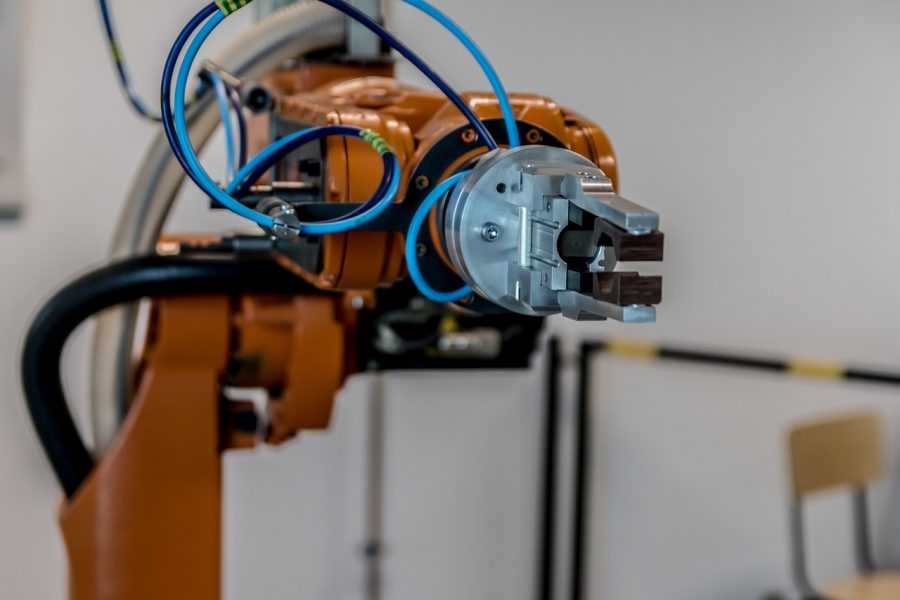Cheering for The Robot Takeover
Image by Michal Jarmoluk from Pixabay
November 15, 2019
Industrial automation has gained somewhat of a bad wrap in the past few decades, given the forecasts of economists and concurrent issues pertaining to companies that utilize automation. Companies like Foxconn and Nike have been under fire, as they plan to replace droves of people, who are already underpaid, with robots.
By the year 2030, economists forecast that upwards of 20 millions jobs will be lost to automation. These findings often put people in job fields that are susceptible to an installment of industrial automation in a panic. While they may seem startling, considering how often it is coupled with the insinuation of a “robot takeover,” it doesn’t warrant any real worrying. There is actually more good to come from this industry than bad, especially when considering its long term benefits. There are often two key components left out when considering the growing use of robotic automation: the jobs that are inversely created from it and the economic efficiency it provides.
Automation and new technology are changing the very nature of many jobs, as well as creating new ones that didn’t exist before.
— Kweilin Ellingrud
The notion that industrial automation is ravaging jobs is a bit blown out of proportions when you really consider the conditions of this field of work. Currently, the tech industry is growing at an extremely rapid pace, much of which has to do with AI that often controls industrial automation. The advancements of the technology in these fields have only reinforced an already rapid climb in demand for workers. Jobs in the field of information technology and computer science have seen an unprecedented growth in the past decades, given the growing predominance of computers in an increasingly technology-driven society. This can partially be attributed to the growth in industrial automation and artificial intelligence, the very thing that economists warn deplete jobs.
Job positions in the field of Cyber Security or Information Security Analyzing, often having to deal with industrial automation, will see a 28% growth in jobs through 2026. Moreover, jobs pertaining to Test Automation Engineering have seen a recent spike in job opportunities as well. It’s market value was $15.87 billion in 2016 and is forecasted to reach upwards of $54.98 billion in 2022. “The career of test automation is growing day by day, not only because it reduces human effort but also because of its demands,” said Jefferey Dunn, an engineer.
In reality, all industrial automation does is displace and add jobs rather than eliminate them. “Automation and new technology are changing the very nature of many jobs, as well as creating new ones that didn’t exist before. As can be expected, different innovations are impacting a wide variety of occupations and fields, leading to significant transformations for workers and companies.” says Kweilin Ellingrud, senior partner at McKinsey & Co.
It would be regressive to give the industries of automation and AI a bad wrap, considering the massive roles they’ve played in developing economies worldwide. Not only that, but virtually all of the technology that we use daily serve as a byproduct to these industries. There is no foreseeable end in the developments of new technologies that further reinforce the use of AI and automation. “AI-driven automation could help boost total factor productivity growth and create new potential to improve the lives of Americans broadly.” as highlighted in a report addressing the effects of AI and automation on the economy by the EOP.
AI-driven automation could help boost total factor productivity growth and create new potential to improve the lives of Americans broadly.
Granted, it goes without saying that there is a small pitfall to it; complacency. As businesses become more and more dependent on these technologies, it becomes easier for them to over-utilize it. “When handed a task that has been AI-powered, your talent is more likely to develop cognitive carelessness; similar to the impact of pilots and drivers who start to solely rely on a vehicle’s autopilot feature.” says Marcus Hatten, a writer for Mondo. Fortunately, this is being compensated through other jobs surrounding automation engineering, testing, and maintenance job positions.
Keeping this in mind, it is important to consider how essential these industries are to our prosperity in general. Economists tend to jump the gun and grab on to negative aspects of the tech industry without any real context to the information that is handed to them.
The growing automation and AI industries are only a part of an ever-changing societal shift. Adapting to these inevitable changes is completely necessary.











![Princess Peach Showtime! [My Take]](https://hillcresthawkeye.com/wp-content/uploads/2024/05/princess-peach-showtime-1200x675.webp)




























